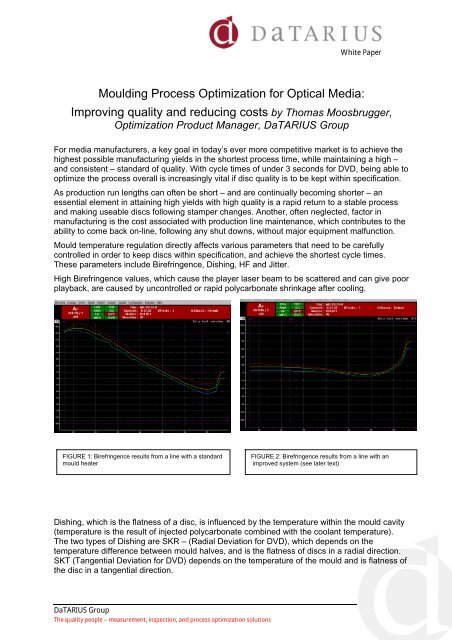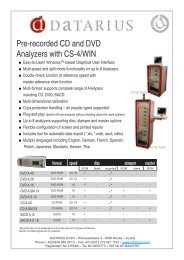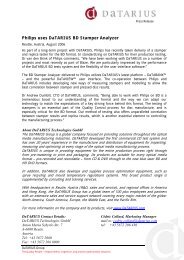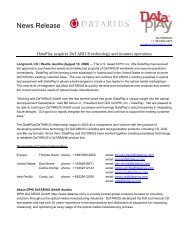Moulding Process Optimization for Optical Media ... - DaTARIUS
Moulding Process Optimization for Optical Media ... - DaTARIUS
Moulding Process Optimization for Optical Media ... - DaTARIUS
Create successful ePaper yourself
Turn your PDF publications into a flip-book with our unique Google optimized e-Paper software.
White Paper<br />
<strong>Moulding</strong> <strong>Process</strong> <strong>Optimization</strong> <strong>for</strong> <strong>Optical</strong> <strong>Media</strong>:<br />
Improving quality and reducing costs by Thomas Moosbrugger,<br />
<strong>Optimization</strong> Product Manager, <strong>DaTARIUS</strong> Group<br />
For media manufacturers, a key goal in today’s ever more competitive market is to achieve the<br />
highest possible manufacturing yields in the shortest process time, while maintaining a high –<br />
and consistent – standard of quality. With cycle times of under 3 seconds <strong>for</strong> DVD, being able to<br />
optimize the process overall is increasingly vital if disc quality is to be kept within specification.<br />
As production run lengths can often be short – and are continually becoming shorter – an<br />
essential element in attaining high yields with high quality is a rapid return to a stable process<br />
and making useable discs following stamper changes. Another, often neglected, factor in<br />
manufacturing is the cost associated with production line maintenance, which contributes to the<br />
ability to come back on-line, following any shut downs, without major equipment malfunction.<br />
Mould temperature regulation directly affects various parameters that need to be carefully<br />
controlled in order to keep discs within specification, and achieve the shortest cycle times.<br />
These parameters include Birefringence, Dishing, HF and Jitter.<br />
High Birefringence values, which cause the player laser beam to be scattered and can give poor<br />
playback, are caused by uncontrolled or rapid polycarbonate shrinkage after cooling.<br />
FIGURE 1: Birefringence results from a line with a standard<br />
mould heater<br />
FIGURE 2: Birefringence results from a line with an<br />
improved system (see later text)<br />
Dishing, which is the flatness of a disc, is influenced by the temperature within the mould cavity<br />
(temperature is the result of injected polycarbonate combined with the coolant temperature).<br />
The two types of Dishing are SKR – (Radial Deviation <strong>for</strong> DVD), which depends on the<br />
temperature difference between mould halves, and is the flatness of discs in a radial direction.<br />
SKT (Tangential Deviation <strong>for</strong> DVD) depends on the temperature of the mould and is flatness of<br />
the disc in a tangential direction.<br />
<strong>DaTARIUS</strong> Group<br />
The quality people – measurement, inspection, and process optimization solutions
White Paper<br />
High HF Signals and poor Jitter are caused by poor <strong>for</strong>mation of pits and lands, and prevent<br />
players from recognizing and decoding data. While these parameters are largely dependent on<br />
stamper quality, they are also significantly influenced by moulding conditions.<br />
Traditional mould temperature regulation techniques have been adapted from other industries<br />
<strong>for</strong> use in the optical media industry. These techniques, which have slow start-up times, rely<br />
simply on controlling temperature on what is often referred to as a constant flow cooling circuit;<br />
these are no more than a simple thermal regulator in a pumped cooling system. The time taken<br />
to adjust the temperature typically leads to significant disc rejects (often in excess of 100 discs)<br />
be<strong>for</strong>e a new setting is stabilized. In the attempt to reduce cycle times, this temperature<br />
adjustment becomes more difficult, and achieving a stable temperature more critical, thus<br />
leading to more reject discs.<br />
The problem ultimately leads to a compromise between the shortest cycle time and how many<br />
discs one is prepared to sacrifice be<strong>for</strong>e this optimum per<strong>for</strong>mance is reached. This is<br />
exacerbated when doing short runs with multiple stamper changes.<br />
Another potential, but significant, failure of these traditional mould temperature regulators is that<br />
the systems overall can lead to extremely contaminated coolant flowing through the mould. This<br />
reduces mould life and can lead to catastrophic failure of the cooling system (typically pump<br />
seal defect) following even modest shut down periods as part of routine maintenance.<br />
These drawbacks point to an obvious need, first of all, <strong>for</strong> a temperature regulating system that<br />
is designed specifically with the optical media manufacturing process in mind. Among the key<br />
elements would be a quick start-up time; fast response time to temperature changes; small<br />
footprint; and low maintenance requirements.<br />
Against this background, <strong>DaTARIUS</strong>, in conjunction with a select group of partners, developed<br />
a revolutionary method of optimizing the mould temperature regulation utilizing patented<br />
technology. The latest generation of this technology is the MF DisCo (Multi-<strong>for</strong>mat Disc<br />
Cooling). Through this technology, the mould temperature regulation can be easily optimized to<br />
suit all types of mould and production lines (both replicated and blank media) from CD and CD-<br />
R/RW through DVD and DVD+/-R/RW, and beyond to BD/HD DVD.<br />
Cycle Time<br />
Mould Locked Signal<br />
on<br />
MF DisCo “flow<br />
off<br />
Hold Time<br />
Mould Close Signal<br />
Injection start<br />
Hold Pressure Start<br />
Cooling Time<br />
Mould Open Signal<br />
Mould Fully Open<br />
Eject and<br />
Take Out<br />
Time<br />
FIGURE 3: The moulding cycle with MF DisCo<br />
<strong>DaTARIUS</strong> Group<br />
The quality people – measurement, inspection, and process optimization solutions
White Paper<br />
Whereas the traditional approach to mould temperature regulation is through ‘constant flow’<br />
cooling, it is clear that the moulding process of optical discs is itself is a cyclical process, and<br />
the heat load to the steel in the mould is, there<strong>for</strong>e, a cyclical load. Accordingly, the basis<br />
behind the MF Disco technology is a high-precision direct coupled temperature regulator that is<br />
synchronized to the moulding process, utilizing a far smaller volume of coolant. Through this<br />
synchronization the flow of coolant is adapted to each of the moulding process stages. This not<br />
only allows optimization of the moulding process itself, but also allows a far more rapid<br />
response time to any requested temperature change, through to a far faster recovery to stable<br />
process following stamper change or any stoppage of the line.<br />
In addition to quality issues, costs are a factor in media manufacturing not to be overlooked, and<br />
with mould temperature regulation there are considerable potential savings in start-up,<br />
temperature changes, and energy. After a stamper change, traditional mould temperature<br />
regulation has taken at best 30 shots to achieve good discs; with MF DisCo, the number of<br />
shots is reduced to as few as 3, providing an instant savings of 27 discs per stamper change.<br />
After each stamper change, the temperature needs to be optimized to that particular stamper.<br />
During this process, further reject discs can be produced while seeking the optimum<br />
temperature. With the faster reaction times of MF DisCo, the quantity of rejected discs here can<br />
also be greatly reduced, resulting in considerable cost savings per year.<br />
A further saving with this direct coupled coolant approach is that up to 65% savings on energy<br />
consumption can be made when compared with standard mould temperature regulators; in<br />
addition, the MF DisCo is designed to replace two standard mould heaters, leading to further<br />
cost savings per year.<br />
Standard Mould Regulator<br />
Mirror Temperature<br />
Minimum temperature of<br />
disc <strong>for</strong> ejection<br />
MF DisCo<br />
Mirror Temperature<br />
*<br />
FIGURE 4: * Cycle time reduction and wider process window <strong>for</strong> more stable quality in a line<br />
using MF DisCo<br />
<strong>DaTARIUS</strong> Group<br />
The quality people – measurement, inspection, and process optimization solutions
White Paper<br />
The special technology behind the MF DisCo has been proved <strong>for</strong> over five years, with the latest<br />
generation MF DisCo on the market <strong>for</strong> two years. It has been installed in over 1,300 lines<br />
worldwide, with significant cost savings and improvements in quality being reported by all the<br />
replicators involved. The above figure demonstrates the improvements in the manufacturing<br />
process window that are possible with an MF DisCo installed on a DVD replication line.<br />
<strong>DaTARIUS</strong> Corporate In<strong>for</strong>mation<br />
<strong>DaTARIUS</strong> is a world-leading supplier of test equipment, not just proving but also improving<br />
optical media quality through comprehensive products and services embracing process<br />
optimization. Our Analyzers and Evaluators support all <strong>for</strong>mats: pre-recorded, recordable, and<br />
rewritable, and our revolutionary DaTABANK technology is fully Blu-ray Disc (BD) and HD-DVD<br />
enabled. Complementing these testers: optimization, including our MF DisCo temperature<br />
regulator; and inspection, with print label, disc orientation and ident code validation. We also<br />
offer extensive training through our service and test centres worldwide. For the past 18 years<br />
<strong>DaTARIUS</strong> has been at the <strong>for</strong>efront of optical media technology with our commitment to the<br />
future of the industry and our customers.<br />
For more in<strong>for</strong>mation on the company and its products, visit www.<strong>DaTARIUS</strong>.com<br />
Copyright 2004, <strong>DaTARIUS</strong> All rights reserved. All other trademarks or registered trademarks are the property of their respective<br />
owners.<br />
<strong>DaTARIUS</strong> Group<br />
The quality people – measurement, inspection, and process optimization solutions












